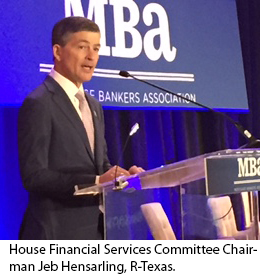
House Chairman Hensarling: ‘Our Goal is to Pass Legislation’
WASHINGTON–Rep. Jeb Hensarling, R-Texas, said with the House, Senate and White House in Republican control, his objective as chairman of the House Financial Services Committee is clear.
“Our one goal this year is to pass legislation,” Hensarling said here yesterday at the Mortgage Bankers Association’s National Advocacy Conference. “Our aim is nothing less than passing legislation that promotes a dynamic, healthier economy with more jobs, higher wages and greater economic freedom for all Americans. America deserves nothing less.”
 Hensarling says he expects the 115th Congress to address GSE reform and praised MBA for continuing to move the needle. “There are a number of thoughtful plans that deserve consideration, including your own,” he said. “I look forward to re-invigorating our dialogue, as your plan is obviously an important contribution to the debate.”
Hensarling says he expects the 115th Congress to address GSE reform and praised MBA for continuing to move the needle. “There are a number of thoughtful plans that deserve consideration, including your own,” he said. “I look forward to re-invigorating our dialogue, as your plan is obviously an important contribution to the debate.”
Hensarling said all Americans deserve a housing finance system that protects both current and future homeowners.
“One that protects taxpayers, so they never again are forced to bail out government-sponsored enterprises like Fannie [Mae] and Freddie [Mac],” Hensarling said. “One that finally breaks the destructive boom-bust-bailout housing cycles that have hurt so many working families and brought our economy to its knees just a few short years ago. This is precisely why sustainable housing finance reform remains a top priority for our committee. And I know it remains a top priority for my Senate counterpart, Chairman [Mike] Crapo [R-Idaho], as well as [Treasury] Secretary [Steven] Mnuchin. It remains the great unaddressed issue from the 2008 crisis. I am confident this is the Congress that will finally achieve this goal.”
However, Hensarling said he remains partial to the House Republican plan–the Protecting American Taxpayers and Homeowners Act, or PATH Act, which passed the committee in the 113th Congress.
“It embodies four goals essential to the development of any free market,” Hensarling said. “First, it defines and limits the role of government. Second, it gets rid of artificial barriers to private capital in order to attract investment and encourage innovation. Third, it gives market participants clear, transparent, and enforceable rules in order to foster competition and restore market discipline. Lastly, it affords consumers clear information to determine which mortgage product suits their needs.”
But before Congress can tackle the “heavy lift” that is sustainable housing finance reform, Hensarling said Congress must tackle reform of the National Flood Insurance Program. The House Financial Services Committee is currently marking up a number of NFIP bills.
“We have much to do because the program expires in 102 days,” Hensarling said. “I support a long-term reauthorization of the flood insurance program because I believe we must provide certainty to the homeowners and small business owners who depend on it for protection. But I believe we must also have a National Flood Insurance Program that protects the interests of hardworking taxpayers…After all, the American taxpayer has been called on to bail out this program in the past. It is a program that is currently drowning in $25 billion of red ink and suffers from an annual actuarial deficit of $1.4 billion.”
Hensarling criticized the structure of the program “that forces roughly 96 percent of Americans to subsidize the remaining 4 percent who participate in it, regardless of their income or need. Taxpayers deserve a reformed flood insurance program that more accurately measures and prices for flood risk.”
Hensarling cited Dodd-Frank Act reform as a third legislative priority. He is author of the CHOICE Act, recently passed the House. He said the bill repeals many provisions of the 2010 Dodd-Frank Act by better aligning incentives and risk by promoting portfolio lending.
“One lesson that should have been learned from the financial crisis is the risks associated with government intervention in mortgage credit allocation,” Hensarling said. “Before the crisis, Washington pushed programs to relax traditional underwriting standards to meet affordable housing goals–with disastrous effects.”
Hensarling said he was optimistic that Congress can make headway on these goals. “It is time for a new path and a better way forward–for flood insurance, for housing finance and for our financial system,” he said. “Although there are others, these are three of the most important priorities for our committee this year.”
